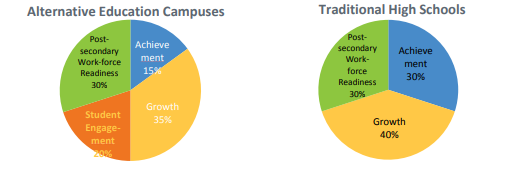You are here
Alternative Education Campus Accountability
Overview
Alternate Education Campuses (AECs) are schools with specialized missions designed to serve high-risk student populations. The Education Accountability Act of 2009 (SB 09-163) authorizes the Department to conduct a distinct performance review for those schools that meet the definition of an AEC. The state's performance framework for AECs takes into account the unique purposes of the campuses and the unique circumstances of the challenges posed by the students enrolled in the campuses.
New Resources!
AEC Cut Point Look Up Document
Upcoming
September 9, 2025: New AEC Leader Training 10:00am-12noon, Zoom Registration Link
Mid September 2025: AEC School Performance Frameworks
Mid September 2025: Communication to districts on Optional Measures being re-normed or sunset
September 25, 2025: New Optional Measures Application Webinar 1:00-3:00pm, Zoom Registration Link
October 1, 2025: New Optional Measure Application Window opens
Office Hours
AEC 2024-25 Stakeholder Workgroup
CDE is planning to host a series of stakeholder feedback meetings regarding AEC Performance Frameworks, collections and supports.
Workgroup Summary Report (PDF) June 27, 2025
Webinars and trainings for AECs for Fall 2025-26
Alternative Education Campus - New Leader Series (AEC SPF/Accountability focus)
Two hour training/webinar for new AEC leaders at the district and school level. This training will cover the AEC collections, Optional Measures, AEC SPF, and more.
Date/Time: September 9, 2025 10:00-12:00 noon
Registration: Zoom Registration Link
Alternative Education Campus - New Optional Measures Application Webinar
Two hour training/webinar for AEC leaders at the district and school level along with AEC data respondents. This training will cover the new process for applying for optional measures that are new to the school and/or new to CDE.
Date/Time: September 25, 2025 1:00-3:00 pm
Registration: Zoom Registration Link
Which students are considered high risk students?
AECs have specialized missions, nontraditional methods of instruction delivery, serve students with severe limitations, and have student populations that are comprised of at least 90% high risk students.
High risk students are those who meet one or more of 15 conditions:
- Habitually Truant
- Juvenile delinquent
- Dropped out of school
- Expelled from school
- History of personal drug or alcohol use
- History of personal street gang involvement
- History of child abuse or neglect/foster care
- Has a parent or guardian in prison
- Has an IEP
- Family history of domestic violence
- Repeated school suspensions
- Pregnant or parenting
- Migrant child
- Homeless child
- History of serious psychiatric or behavioral disorder
- Over-age/ under-credited
Note: The shared experience of a global pandemic does not qualify as meeting the "other high risk" definition on its own"
Which schools are designated as AECs?
Below is the list of current AECs as approved by the State Board of Education.
-
Schools Designated as Alternative Education Campuses 2025-26
-
Schools designated as Alternative Education Campuses 2024-25
How is performance assessed for AECs?
In addition to Academic Achievement, Academic Growth, and Postsecondary & Workforce Readiness, AECs have an additional required measure of Student Engagement, and weightings of measures are slightly different from traditional schools to account for the high-risk population of students served.
What overall ratings are assigned for AECs?
AECs are assigned one of four ratings based on the percentage of points earned across the four performance indicators shown in the pie chart above. Insufficient state data is assigned if there is not enough outcome data to assign a rating.
AEC Performance Plan - AECs with a Performance Plan are meeting expectations on the majority of performance metrics.
AEC Improvement Plan - These AECs are identified as lower performing. They may be meeting expectations on some performance metrics, but they are not meeting or are only approaching expectations on many.
AEC Priority Improvement Plan - These AECs are identified as low performing. They are not meeting or are only approaching expectations on most performance metrics. The state will provide support and oversight to these schools until they improve.
AEC Turnaround Plan - These AECs are identified as among the lowest performing schools in the state. They are not meeting or are only approaching expectations on most performance metrics. The state will provide support and oversight to these schools until they improve.
AEC Insufficient State Data - Historically, the Insufficient State Data plan type has not been assigned to AECs. In 2022, given the lack of required data available, a portion of AECs did not have enough data to meaningfully determine their performance. Insufficient State Data plan types were assigned to AECs using the same criteria used to assign this plan type to non-AEC schools.
Resources
Accountability resources are available at: https://www.cde.state.co.us/accountability/accountability-resources.
Helpful Links
- For information on the AEC collections for school and district staff, please visit our AEC Collections page.
Contact Us
For more information, please contact:
-
B Sanders, PhD - sanders_b@cde.state.co.us, 303-866-2865
-
April Thompson, thompson_april@cde.state.co.us 303-358-7363




Connect With Us





